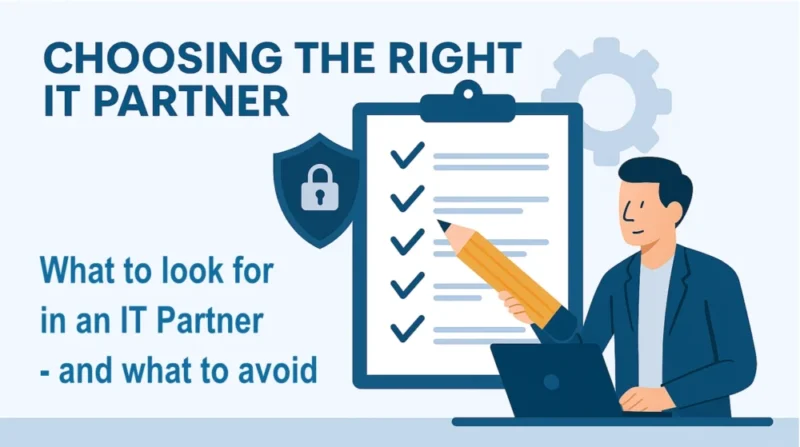
Choosing the Right IT Partner
What to look for — and what to avoid
Choosing an IT partner can feel overwhelming — especially if you’re not deeply technical. But the right partner makes all the difference. They don’t just fix things — they guide you, protect your business, and help you grow.
In today’s connected world, IT touches every part of your company: your data, your team, your tools, and your customers. A reliable IT partner helps you stay efficient, secure, and ready to scale. The wrong one can hold you back, expose you to risk, and leave you dealing with recurring problems.
What to Look For in an IT Partner
- Responsiveness: Can they support you quickly when something breaks? Do they offer SLAs or guaranteed response times? Are they available when your business actually needs them?
- Expertise Across the Stack: From Microsoft 365 and Entra ID to endpoint protection and backup, look for a partner who understands your whole environment, not just isolated parts.
- Proactive Support: Are they preventing problems with monitoring, patching, and early detection? Or are they just waiting for tickets to come in?
- Transparent Communication: Do they speak your language and explain issues clearly? Or do they hide behind technical jargon and vague answers?
- Flexible Contracts: Can they adapt to your changing needs? Will they scale with your team? Are their service levels clear, or buried in fine print?
When you find an IT partner who checks these boxes, your IT becomes more than a service — it becomes a strategic advantage. You spend less time worrying about systems, and more time focused on your business.
What Can Happen with the Wrong Provider
Too often, businesses stay with the wrong IT partner because switching feels hard. But here’s what we regularly see when a provider isn’t dedicated:
- Slow response times that drag out simple issues and cause unnecessary downtime.
- Missed security updates, leaving systems vulnerable to malware and breaches.
- Lack of clear responsibility when problems happen, with finger-pointing instead of solutions.
- Generic solutions that don’t actually match your business needs or growth plans.
- Limited visibility, where you never really know what’s being done, or if it’s enough.
These gaps add up. The result? Frustration, lost productivity, and sometimes costly recoveries that could have been avoided entirely.
What to Avoid
- One-size-fits-all Packages: Every business is different. Your IT support should reflect that.
- Mystery Costs: Be wary of vague pricing or hidden fees. You deserve transparency.
- Outdated Tools: A good partner should use modern tools to manage systems, access, and support.
- Slow Response Times: If they’re slow now, imagine the delay during an actual emergency.
Final Thoughts
IT support is a relationship. Like any good relationship, it requires trust, communication, and shared goals. The right partner should feel like a natural extension of your team — not just someone you call when things go wrong.
Take the time to evaluate your current provider. Are they helping you grow, or holding you back?
If you’re unsure, start with a conversation. A strong partner will offer clarity, not confusion.
🔎 Want to learn more about who we are and how we work? Click here to visit our About Us page.
